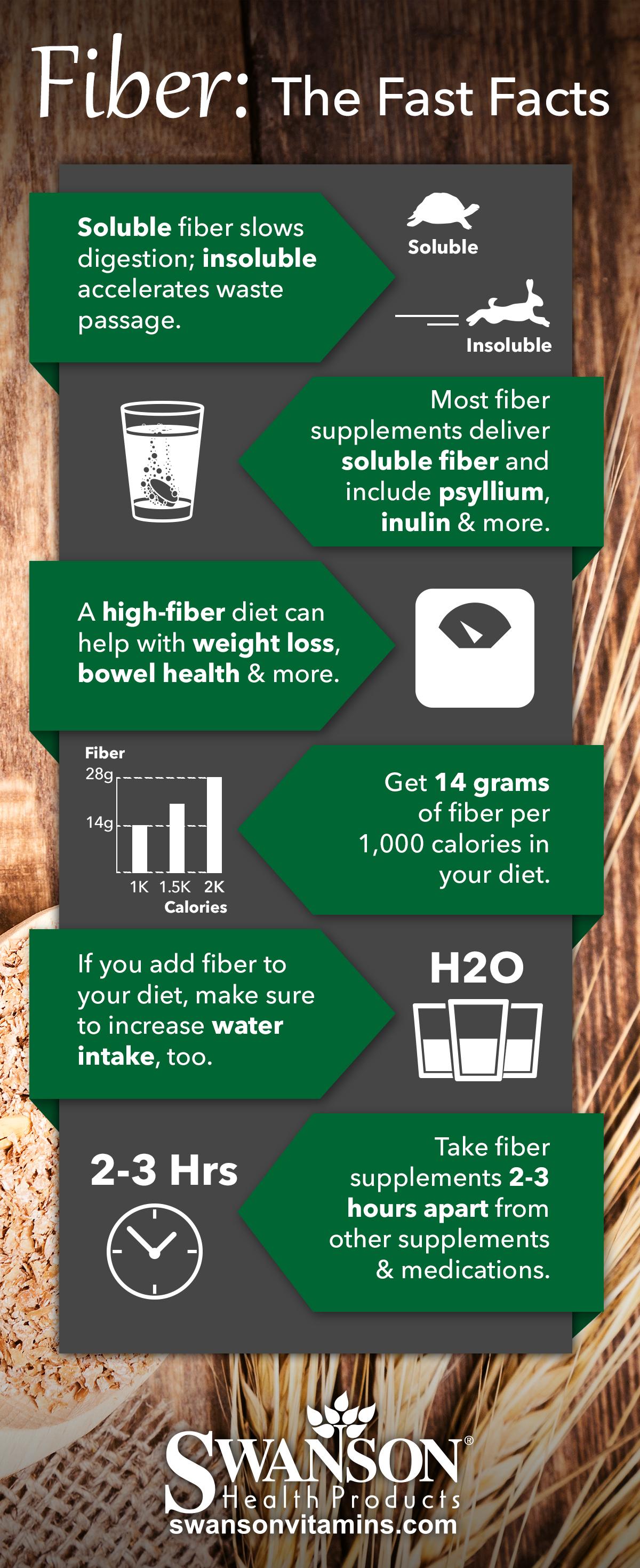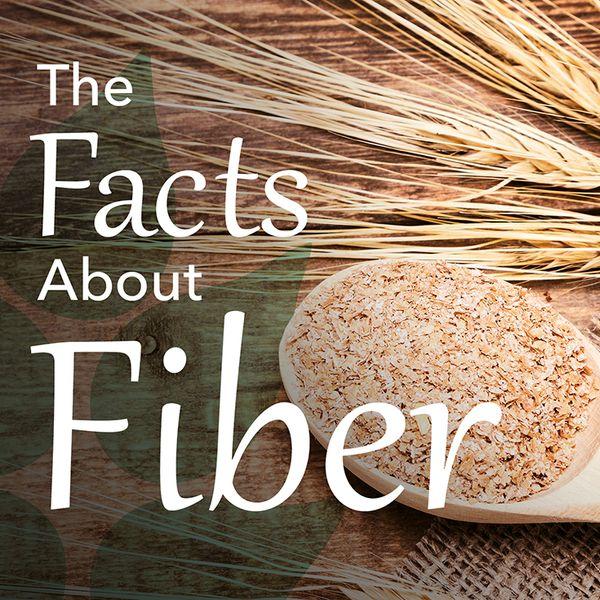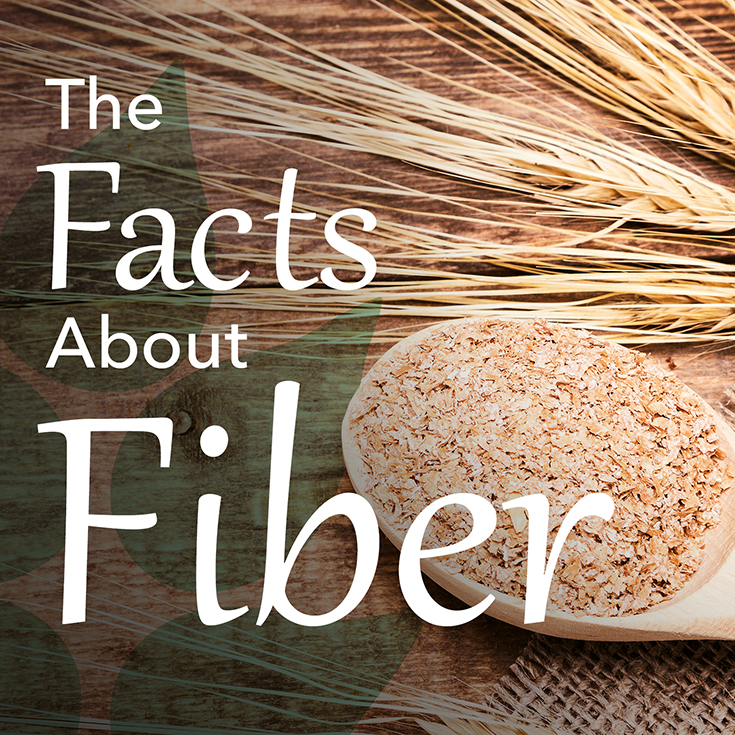You know your body needs fiber. But do you know why? Are you getting enough fiber? What can you add to your diet to make sure you’re getting enough? Some of the facts may surprise you!
Fiber is a plant-based nutrient that resists digestive enzymes, meaning it’s not absorbed into the body. Instead, it keeps food moving efficiently throughout the body and is a key player in regular trips to the bathroom.
Types of Fiber
There are two types of fiber: soluble and insoluble.
Soluble fiber absorbs water from food, which slows down digestion. Slower digestion can be helpful for supporting healthy blood sugar and cholesterol levels already in the normal ranges.
Foods rich in soluble fiber include beans, brussels sprouts, pears, avocado, nuts, psyllium, oatmeal, flax seed, barley, dried peas, oranges, apples, carrots, cucumbers, celery and more.
Insoluble fiber accelerates the passage of waste and food. It doesn’t absorb water or dissolve. Some of the scientific names for insoluble fiber include cellulose, lignins and hemicelluloses.
Some foods high in insoluble fiber include whole wheat, whole grains, wheat bran, corn bran, seeds, nuts, barley, couscous, brown rice, bulgur, zucchini, celery, broccoli, cabbage, onions, tomatoes, carrots, cucumbers, green beans, dark leafy vegetables, raisins, grapes, fruit and root vegetable skins, cabbage, lettuce, bell peppers, outer husk of corn kernels, grapes and peas.
Lots of foods contain both types of fiber, so to get the highest health benefit, stick to a wide variety of high-fiber foods.
Top Fiber FAQs
What are the benefits of a high-fiber diet?
- Helps with weight loss & healthy weight management
- Helps support healthy blood sugar levels already within the normal range
- Normalizes bowel movements & maintains bowel health
- Helps support healthy cholesterol levels already within the normal range
- Promotes heart health
How much fiber do I need?
An easy guideline is to aim for 14 grams of fiber for every 1,000 calories in your diet. The national fiber recommendations are 30 to 38 grams a day for men, 25 grams a day for women between 18 and 50 years old and 21 grams a day for women 51+.
What are the best fiber supplements?
Most fiber supplements deliver soluble fiber, usually in powder or pill form. Here are some of the most common kinds:
Psyllium husk is the most common fiber source found in supplements. Psyllium comes from a shrub-like herb called Plantago ovate. Psyllium benefits include supporting healthy cholesterol levels already within the normal range. One of the disadvantages is that the powder thickens quickly, making it difficult to incorporate into beverages.
Inulin is extracted from foods such as chicory root. It is tasteless and colorless, making is easy to add to foods. Inulin has prebiotic characteristics, which helps stimulate beneficial bacteria in the gut. One of the downfalls of inulin is that it hasn’t been shown to help much with regularity or digestive issues.
Wheat dextrin is a by-product of wheat processing. It’s often used in cooking and dissolving in water. Wheat dextrin contains trace amounts of gluten, so it’s not ideal for those with celiac or gluten intolerance.
Methylcellulose is a non-fermentable fiber, meaning it’s unlikely to cause digestive distress. It has similar properties to psyllium, forming a gel in the digestive tract to help bulk up stool.
Gum acacia comes from the acacia tree, and it is great for lower GI comfort. Acacia fiber supplements are growing in popularity.
While powder vs. pill is a personal preference, we recommend asking your healthcare provider which form of fiber is best for you. Start by adding a small amount of fiber to your diet and drink plenty of water throughout the day. Some fiber supplements can cause gastrointestinal side effects like bloating, gas and nausea, so increase your fiber intake slowly.
Can fiber supplements interfere with other supplements or medications?
Yes, fiber supplements can decrease the absorption of some nutrients and medications, like aspirin or certain diabetes and cholesterol medications.
Soluble fiber forms a gel when mixed with fluid in the stomach, preventing rapid uptake of carbohydrates. It can also slow the uptake of dietary fats into your blood (absorption of fat-soluble vitamins A, D, E and K and essential omega-3 fatty acids). Excess fiber can bind to iron, zinc, calcium, and magnesium and decrease their absorption when consumed at the same time as a meal. However, adults who consume the recommended amounts of fiber—25 grams a day for women and 30 to 38 grams a day for men—are unlikely to have problems with nutrient absorption.
To avoid this, take fiber supplements and any other supplements or medications at least two to three hours apart.

Tips for starting with fiber supplements
Want to know when to take a fiber supplement? These guidelines can help you avoid side effects and interference with drug and nutrient absorption when you take fiber supplements:
- Check with your healthcare provider before starting a fiber supplement.
- Gradually increase the amount of fiber you take each day.
- Do not consume fiber in excess of what your body needs.
- Drink plenty of liquids—about 64 ounces daily—to avoid discomfort.
- Spread fiber intake throughout the day.
- Take fiber supplements separately from medication; take medications at least one hour before fiber supplements or two hours after fiber supplements.
A special thanks to Sarah Wells, Registered Dietitian Nutritionist at Swanson Health Products.
Sources
- Webmd.com
- Mayoclinic.org




